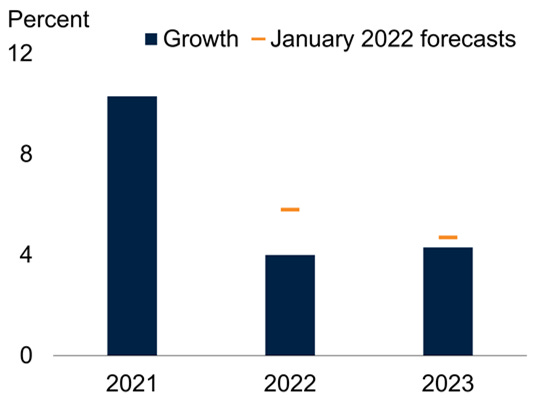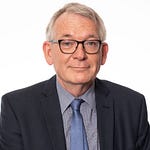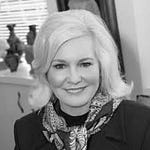“I’m a great believer that diplomacy is extremely important, that we have a number of issues where we can work with China, and they will be beneficial to both of us, and that we ought to have regular high-level meetings between our two Presidents, and that we ought to have working groups that report to them that meet perhaps quarterly and begin to pick the low-hanging fruit. You mentioned tariffs. That’s hurting our workers, our businesses, our farmers. And it’s hurting China.”
Things have gotten so contentious recently that it is a rare pleasure to hear considered, measured, and knowledgable perspectives on any issue. Trade in particular has become highly politicized, failing to erase the divides between nations as many so ferverently hoped when globalization accelerated in the 80’s and 90’s.
In fact, when Carla Anderson Hills, my guest for the 34th episode of the Hale Report became the US Trade Representative in 1989, global GDP was about 21 trillion, and global trade (all goods imports and exports) was $2.3 trillion, or less than 10% of world economic activity. In 2021 global trade was $28.5 trillion - nearly one-third of total world GDP of $94T.
Is trade, the engine of global growth, slowing down permanently post-Covid? This chart on world trade from the World Bank June 2022 report on Global Economic Prospects says so far, yes. This is a critical issue for investors to watch.
I discussed the future of international trade with Ambassador Hills, one of the key architects of our current system. Short take: she thinks all of our global institutions including the World Trade Organization are in need of an update, and our leaders must urgently engage with each other.
I have long admired Ambassador Hills, also the mother of four children, who has long been a model for women in our field. It might be hard for our younger readers to believe, but when I was just beginning my career in the 1980’s, very few women were involved in international trade in the US - and really none at her level. At that time, with my dear friend Claudia McLaughlin, we founded Women in International Trade (WIT) in Chicago. WIT was a precursor to OWIT now a very active worldwide organization founded the same year Ambassador Hills was appointed to USTR, to try to do something about that. Which is to explain all the more why my guest is held in such esteem by so many.
Captain of the tennis team at Stanford, and trained as a lawyer at Yale, Ambassador Hills served as United States Trade Representative from 1989-1993. As a member of President George H.W. Bush's Cabinet (only the third female Cabinet member) she was the President's principal advisor on international trade policy, and the nation's chief trade negotiator. She negotiated and concluded NAFTA and also led the U.S. negotiations on the Uruguay Round of the World Trade Organization. Drawing upon her international experience, she has been called to serve on a number of corporate and non-profit boards and advisory boards, including the Council on Foreign Relations. She is a founder of Hills & Company, which recently joined Dentons Global Advisors-Albright Stonebridge Associates, where she is currently Senior Counselor.
Not everyone agrees with Ambassador Hills quote above that ending the China tariffs would be beneficial, including a former USTR head, Robert Lighthizer. He writes “The AFL-CIO, America’s largest federation of labor unions, has stated that cutting Section 301 tariffs would ‘weaken US enforcement of trade laws that are necessary to stop China’s illegal trade practices.’ Hills agrees that labor has a right to be upset about China, but that our fundamental failure was in not supporting displaced workers with education and other remedies as globalization took off. As we begin Labor Day weekend in the United States, it is timely to remember the intricate relationship between trade and labor.
I was honored to discuss Ambassador Hills’ experiences and thoughts about what we need to do now to maintain stability in a world full of geopolitical surprises. I hope you enjoy this podcast, and as well as my guest’s clarity, graciousness and keen observations. Her voice is a voice we need to hear today.
Upcoming
Our next podcast features the Vice Chair of ValueEdge Advisors Nell Minow, a leading figure in corporate governance, and a movie aficionado.
Following on to our trade discussion, we have two upcoming podcasts on China in the run up to the 20th Party Congress on October 16th.
I am pleased to introduce the first in a special series by EconVue expert Karim Pakravan:
Emerging Markets at the Cusp: Part One-The Past as Prologue
Emerging Markets face a challenging global environment, living with the legacy of the pandemic, and the Ukraine war. In this series, we apply the techniques of Country Risk Analysis to assess the changing risk environment, especially as it applies to a much-discussed and potential debt crisis. How real is this fear?
With all best wishes,
Lyric Hughes Hale
Editor-in-Chief
EconVue
Chicago
lyric@econvue.com
Twitter: @lyrichues
@HaleReport














